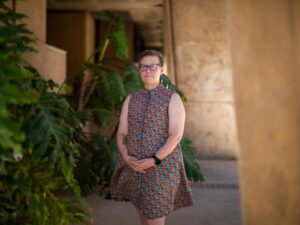The Black News Channel, founded by a former Republican congressman, will try to win the growing Black cable news audience. Concerns about who’s running the network have raised the question: Can it succeed?
The Black News Channel, the first 24-hour news channel aimed specifically at an African American audience, is set to launch on Feb. 10 to coincide with Black History Month.
Founded by former Rep. J.C. Watts, a Republican from Oklahoma, the network will premiere in 33 million households primarily in large African American markets such as New York City, Los Angeles and Atlanta.
Based in Tallahassee, Florida, BNC says it will produce television programming and digital content written and produced “by black people, for black people.”
BNC programming will feature all-black on-air talent like former libertarian radio host Larry Elder and will pull from historically black colleges and universities for much of its on-air expertise, according to Watts. The network will not be entirely black-run or owned, though: CEO Bob Brillante and COO Jim Zerwekh are both white.
Watts said the network will provide reliable and accurate nonpartisan coverage of issues that are often neglected by mainstream media outlets, like mass incarceration, but said it would also cover other areas from a black perspective, such as health and wellness.
Watts told NBC that planning for the network began more than 10 years ago. He said he knew then that there was market demand for a black news channel, and that his company’s research shows that demand still exists.
A 2018 Nielsen report found that MSNBC, the 24-hour news channel, was the most popular prime-time cable channel with African Americans. And according to a 2012 Niselsen study, 91 percent of African Americans believe that black-owned media is more relevant to them. With the BNC, Watts saw a chance to meet the growing demand for cable news among the African American community.
“Today, information is so targeted to groups,” Watts said. “Every demographic out there has a venue that they can access for news information, culture, wellness, etc. Except for the African American community.”
The channel will partner with the National Newspaper Publishers Association, a trade association made up of over 200 African American-owned community newspapers across the country. The association’s president, Benjamin Chavis, told NBC that the association would act as a system of national bureaus, and much of BNC’s news coverage would build on reporting done by NNPA members at a local level.

According to Chavis, the association would benefit from the BNC’s distribution network and digital advertising revenue. He added that he believes in BNC’s mission, and is excited that the newspaper publishers association will be a part of it.
“One of the things I witnessed in my 30-plus years in the black press is that there’s been a tendency for black news to be marginalized and underdistributed,” Chavis said. “To me, there’s an opportunity for the black press to fill that void.”
For Chavis, that doesn’t just mean having the ability to cover issues like environmental racism and police brutality from a black perspective — it also means amplifying positive news coverage that is largely ignored by the mainstream media.
“The mainstream media covers the pathology of black America. They don’t cover the sociology of it,” Chavis said. “The success stories are important for our community, to see black Americans striving for and achieving excellence.”
When it premieres this month, the BNC will enter the canon of the black press, an institution with a crucial place in the long history of African Americans’ struggle for civil rights. Black-owned newspapers helped jumpstart the Great Migration in the mid-1910s, and gave black news consumers a more sympathetic voice for stories about Jim Crow-era oppression and racist violence, like the Emmett Till murder.
The reach of the black press, once both profitable and highly influential, has waned significantly in the past few decades. According to a report on the state of African American media published last year by the Obsidian Collection, an organization that is archiving and preserving African American owned newspapers, black newspapers have seen their profitability fall sharply since the advent of digital news and social media.
“The fact that we had a vibrant black press separate from mainstream press was essential to our own success,” Angela Ford, founder of the Obsidian Collection, told NBC. “Losing that, or having that fade substantially, has allowed … the narrative of the black experience, the narrative of African American history itself, to be co-opted, misrepresented and watered down by corporate media.”
The BNC’s launch comes at a time when the black press is at a crossroads. The Chicago Defender, the 115-year old newspaper that reached millions and once featured legendary black writers like Frederick Douglass and Ida B. Wells, ceased all print operations last summer. And Ebony magazine, founded in 1972, shuttered the same month as the Defender, after struggling to pay its writers amid a difficult bankruptcy.
For Chavis, whose NNPA represents the Defenderalong with other legacy newspapers like The Omaha Star, the loss of these black news outlets is bittersweet: both a tragedy and an opportunity to adapt to new business models, one that he believes BNC will capitalize on.
Tiffany Walden was one of the Ebony writers who eventually got paid, and she was named in a lawsuit filed against the now-defunct magazine. She runs her own digital media outlet called The Triibe, which she co-founded with video journalist Morgan Johnson in 2017. The website covers the African American community in Chicago, and its stated goal is to “re-shape the narrative of black Chicago” by putting control of that narrative back in the hands of black storytellers and content creators.
Walden isn’t so sure BNC can, or should, fill the void that floundering black news outlets are leaving behind. She agreed that television news is clearly an area where black-owned media has much room to grow – her grandmother, she said, watches CNN all day. But Walden also expressed concern about Watts’ background as a congressman for a party she believes is antithetical to African American progress. And the fact that the CEO and COO are conservative white men, she added, does not bode well for BNC’s ability to cover the issues that matter to the black community.
“It matters who owns these publications. The people, the communities, the content creators, the storytellers, we should be owning our media companies,” she said. “It would have been a breath of fresh air to have something like this. But I just can’t get past the fact that it’s run by two Republican white men.”
Brillante and Zerwekh are both registered Republicans, according to public voter registration data.
And BNC’s largest investor is a Republican, Shad Khan, the only Muslim owner in the NFL (the Jacksonville Jaguars).
Ford echoed Walden’s skepticism. She said that she was excited about the prospect of a black 24-hour news channel, but that she’s doubtful of the network’s ability to escape corporate influence and speak authentically to the African American community.
“I will be looking with enthusiasm to see if this is black people authentically talking to each other, or another corporate strategy to capitalize on a category of people,” she said.
Chavis, the NNPA president, has a long history of fighting for African Americans’ civil rights. In his youth he was an assistant to Martin Luther King Jr. and rose to prominence as a member of the Wilmington Ten, who were wrongly convicted of arson and conspiracy in 1971 in North Carolina (all 10 spent nearly a decade in prison before being released and pardoned). He said that he sees the NNPA’s partnership with Watts’ BNC as an important example of bipartisan cooperation toward a common goal.
“Even though I’m a Democrat and he is a Republican, I felt it was time for black people in the media to work together without getting involved or entrenched in the partisan divide,” Chavis said.
Ford maintains that her confidence in BNC as an authentic, game-changing black news outlet is limited. But if she’s proved wrong, she’ll be pleasantly surprised.
“I am optimistic about the future of black journalism, and I think there is a demand for a black TV network that speaks to today’s African American audience,” Ford said. “I don’t know if that’s what this is.”




